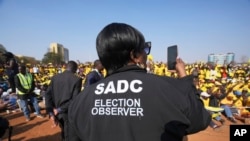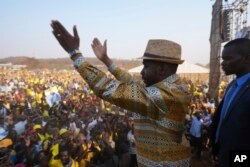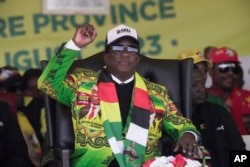The run-up to Zimbabwe’s election Wednesday has seen political campaigns use music concerts, celebrities and sporting heroes to attract and energize young voters. But some analysts say Zimbabwe’s rural-urban divide could be the deciding factor in the election.
Eleven candidates are vying for the presidency, but the main contest will be between the incumbent president, 80-year-old Emmerson Mnangagwa, and Nelson Chamisa, 45, leader of the Citizens Coalition for Change, or CCC.
The election marks Chamisa’s second bid to unseat Mnangagwa and break the ruling ZANU-PF’s 43-year grip on power.
Chamisa, a lawyer and former preacher, is largely popular among Zimbabwe’s urban and youth voters, as some have only known a nation mired in economic challenges, troubled by chronic high unemployment and rising prices.
Young voters tend to show greater support for the CCC — and one-sixth of Zimbabwe's 6.6 million registered voters are casting ballots for the first time this year.
Professor Ricky Mukonza from Tshwane University of Technology in South Africa says the elections are not just about the voters' ages, but where they live.
According to the World Bank, 67.4% of Zimbabweans were living in rural areas in 2022. ZANU-PF has long enjoyed strong support in these areas, where state funds and powerful patronage networks have helped the ruling party secure support.
The main opposition has traditionally had its support concentrated in the southern African nation's urban centers.
Mukonza says urban youth voters tend to be "noisier" on social media and at opposition rallies, "giving the impression there are more of them than there really are."
"That pre-election energy rarely translates to high youth turnout at the ballot box," he told VOA.
In the 2018 election, which saw Mnangagwa win 50.8% of the vote, turnout was at 75%, according to Zimbabwean election officials. It is not clear how many voters turned out in rural areas versus urban.
Mukonza predicts a strong showing in Wednesday's poll among the rural electorate, whom he refers to as "Zimbabwe’s silent majority."
"If we go by past voting patterns, ZANU-PF will win with high margins in the rural areas and will lose with high margins in the urban areas," Mukonza said.
Chamisa seeks rural support
The CCC seems to recognize the power of the rural vote. The party promised to prioritize voters living outside the cities but told supporters to brace for a "rough election campaign."
"We've seen Chamisa campaigning very strongly in rural areas,” said Chipo Dendere, an assistant professor of Africana Studies at U.S.-based Wellesley College.
“The question isn't whether the message is right to rural voters. It's whether or not rural voters will feel comfortable on election day to put their 'X' on Nelson Chamisa," Dendere told VOA’s “Straight Talk Africa.”
Drumming up opposition support in ZANU-PF territory has proven to be a mammoth task for Chamisa. Police have blocked several CCC rallies across the country in the run-up to the elections.
Alleged attacks on CCC supporters have stoked fears Zimbabwe’s violent election history is already repeating itself.
In an interview with The Associated Press, Chamisa alleged that people in rural areas, far from the international spotlight, are making their political choices under the threat of violence. Chamisa said, for some, it was a choice of "death or ZANU-PF."
Voter intimidation, unfair electoral processes
A report released by Human Rights Watch documented first-hand accounts of abductions, arbitrary arrests of political opposition figures and government critics, and other human rights abuses ahead of Wednesday’s election.
Zimbabwe-based voter watchdog Electoral Resource Center says there have been reports of voter intimidation, especially in rural areas of the country.
"General public sentiment, as noted in several surveys, reveals that people have very little confidence in the electoral process as well as the election management body in the country," the ERC said in a statement released this week.
The president, ZANU-PF officials and its supporters have denied any foul play.
At a news conference on Thursday, ZANU-PF spokesperson Chris Mutsvangwa denied allegations of voter intimidation and unfair electoral processes.
He accused the opposition of being "obsessed with criticizing the electoral process so that they have something to say after losing."
For Mukonza, this kind of violent backdrop makes it hard to distinguish whether some people vote out of loyalty or fear. "Even if those in the rural areas have a change of heart or start to warm up to the main opposition party," he said, "ultimately they will still vote for the ruling party."
Dendere said rural voters "understand political violence in a way that urban voters might not." Because of that, she said, some may vote for the ruling party as a form of self-protection.
"And that’s the biggest challenge for the opposition. Can they convince rural voters that their vote will be protected, and that they, too, will be protected if they vote their choice?" Dendere said.
Zimbabwe’s foreign affairs ministry says it has invited 46 countries and 17 international organizations, including the African Union and the European Union, to observe the elections.
Addressing a 150,000-strong crowd at a ZANU-PF rally in Harare earlier this month, Mnangagwa told supporters they would be "lost" if they did not vote for ZANU-PF and re-elect him, adding, "No one will stop us from ruling this country."
This story originated in VOA’s English to Africa service. Some information in this report came from Reuters.






